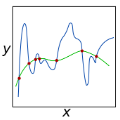We study the problem of self-supervised structured representation learning using autoencoders for generative modeling. Unlike most methods which rely on matching an arbitrary, relatively unstructured, prior distribution for sampling, we propose a sampling technique that relies solely on the independence of latent variables, thereby avoiding the trade-off between reconstruction quality and generative performance inherent to VAEs. We design a novel autoencoder architecture capable of learning a structured representation without the need for aggressive regularization. Our structural decoders learn a hierarchy of latent variables, akin to structural causal models, thereby ordering the information without any additional regularization. We demonstrate how these models learn a representation that improves results in a variety of downstream tasks including generation, disentanglement, and extrapolation using several challenging and natural image datasets.
翻译:我们研究使用自动编码器进行基因模型的自我监督结构化代表制学习的问题。与多数依靠任意的、相对无结构的、先前的抽样分布方法不同的是,我们建议采用完全依赖潜在变量独立性的抽样技术,从而避免重建质量与VAEs固有的基因化性能之间的权衡。我们设计了一个新型的自动编码结构,能够学习结构化代表制,而不需要激进的正规化。我们的结构编码器学会了类似于结构性因果模型的潜伏变量的等级,从而在不作任何额外规范的情况下订购信息。我们演示这些模型如何学会一种代表制,用几种具有挑战性的自然图像数据集来改进下游任务,包括生成、分解和外推。





